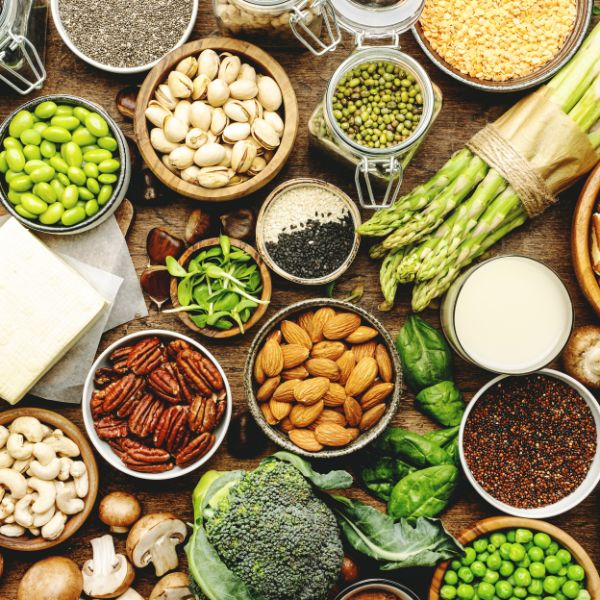 Lack of protein is a common concern about vegetarian and vegan diets. Yet going meatless and dairy-free can supply your body with sufficient protein if you take a strategic and knowledgeable approach.
Lack of protein is a common concern about vegetarian and vegan diets. Yet going meatless and dairy-free can supply your body with sufficient protein if you take a strategic and knowledgeable approach.
What Is Protein?
These essential nutrients are made up of 22 amino acids that support your body’s systems, help regulate blood sugar, energy production and fat metabolism. Nine of the amino acids are essential yet not naturally produced by the body. Animal-based proteins offer all of them but not all plant-based proteins do, which is why you need to be conscious of what you’re eating while on a vegan or vegetarian diet.
As many plant-based proteins are considered “incomplete” sources, vegetarians and vegans need to pair protein sources throughout the day. While you might automatically think of beans and tofu for protein, explore all possible sources.
Seitan
Seitan is known as a “wheat meat” for its gluten-based composition but in terms of protein, it provides 25 grams in every 3.5 ounce serving. Seitan can be cooked like meat and maintains a similar texture.
Soybean Products
These encompass fermented and processed forms, like tofu, soymilk and tempeh, as well as edamame. Soybeans are a complete protein source and do not need to be paired with any other sources to deliver your full scope of essential amino acids.
Protein amounts vary from 12 to 20 grams per 3.5 ounce serving, while soymilk provides 6 grams per cup. Many soybean-based products are also fortified with calcium, vitamin B12 and vitamin D.
Lentils
In vegetarian and vegan cooking, lentils can be eaten alone, mixed with vegetables in place of ground meat or mashed and rolled into balls. One cooked cup offers 18 grams of protein, as well as roughly half of your daily fiber intake and is a source of iron.
Beans
From kidney to pinto and garbanzo, beans offer about 15 grams of protein for every cooked cup, in addition to fiber, iron, potassium, manganese and phosphorous.
Peas
Select imitation meats use pea protein for the nine grams provided per cooked cup, as well as nutrients like iron, fiber, vitamins A and C, B vitamins and copper.
Nuts and Seeds
Considered an ideal snack when monitoring protein intake, nuts offer five to seven grams of protein for each 28-gram serving. Among other benefits, raw nuts provide you with iron, calcium, magnesium, phosphorous and antioxidants.
For seeds, hemp and chia both offer a reliable source of protein. Hemp provides nine grams for every tablespoon, in addition to omega-3 and 6 fatty acids, while chia seeds have two grams in every tablespoon. Both can be sprinkled on food to boost the protein content.
Chia seeds can also be soaked so they expand and take on a gel-like consistency. This can be eaten on its own as a chia seed pudding or used as an egg substitute for baking.
Ancient Grains
This group includes spelt, barley, farro, einkorn and sorghum, all of which offer at least 10 grams of protein per cooked cup. However, it’s important to note that nutritional content varies. Certain sources contain gluten, while others are gluten-free proteins. Forms include grains that can be cooked similar to rice, as well as flours.
Quinoa
A grain that does not grow from a grass source, quinoa offers two key benefits for those on a vegetarian or vegan diet. It’s considered a complete protein, with 22 amino acids and a single 100-gram cooked serving has four grams of protein. Like other grains, quinoa can be boiled or is available in flour form.
Spirulina
If you drink green smoothies, you might have spotted spirulina among the ingredients of a pre-made powder. As a nutrient, spirulina is fairly powerful with eight grams of complete protein and a quarter of your daily iron intake. Spirulina also provides essential fatty acids and antioxidants.
Oats
A reliable source of fiber and popular breakfast choice for its convenience and heartiness, half a cup of dry oats has five grams of protein.
Buckwheat
Considered a seed, buckwheat provides fiber and about five grams of protein for every 100-gram serving. Buckwheat is another gluten-free protein source and can be found in pasta and flour form.
Vegetables
In vegetarian and vegan diets, vegetables are the predominate source of vitamins, minerals and fiber but you’ll also find protein. Good sources include asparagus, avocado, broccoli, cauliflower, kale, artichokes and Brussel sprouts.
Explore a full range of protein sources on our vegan menu. Stop by our Wallingford restaurant or place a to-go order today!






